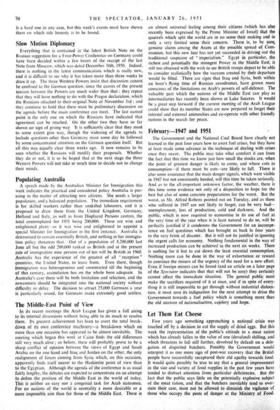February-1947 and 1951 The Government and the National Coal Board
have clearly not learned in the past four years how to avert fuel crises, but they have at least made some advance in the technique of dealing with crises once they occur. The public may take what comfort it can from the fact that this time we know just how small the stocks are, when the point of greatest danger is likely to come, and where cuts in consumption—if there must be cuts—are likely to fall. There is also some assurance that the main danger signals, which were visible in 1947 but not consistently heeded, will this time be taken seriously. And as to the all-important unknown factor, the weather, there is this time some evidence not only of a disposition to hope for the best but also of some concrete preparations for the worst. But the worst, as Mr. Alfred Robens pointed out on Tuesday, and as those who suffered in 1947 are not likely to forget, can be very bad— unemployment, loss of production, cold and darkness. And the public, which is now required to economise in its use of fuel at the very time of the year when it is least natural to do so, will be perfectly justified if it condemns the Government for an incompe- tence on fuel questions which has brought us back in four years to the very brink of disaster. But it will not be justified in ignoring the urgent calls for economy. Nothing fundamental in the way .of increased production can be achieved in the next six weeks. There is nothing for it but to cut down the least essential consumption. Nothing more can be done in the way of exhortation or reward to convince the miners of the urgency of the need for a new effort. Even if foreign miners can be found (and an article on a later page of the Spectator indicates that that will not be easy) they certainly cannot affect the immediate situation. The general public must make the sacrifices required of it at once, and if in spite of every- thing it is still impossible to get through without industrial disloca- tion, it must save its indignation for the next attempt to drive the Government towards a fuel policy which is something more than the old mixture of nationalisation, cajolery and hope.






































 Previous page
Previous page